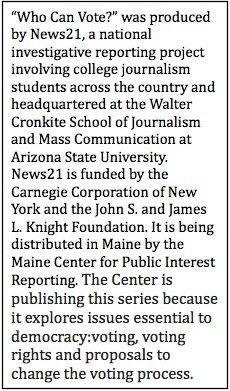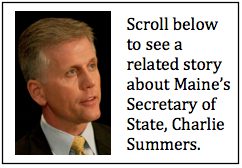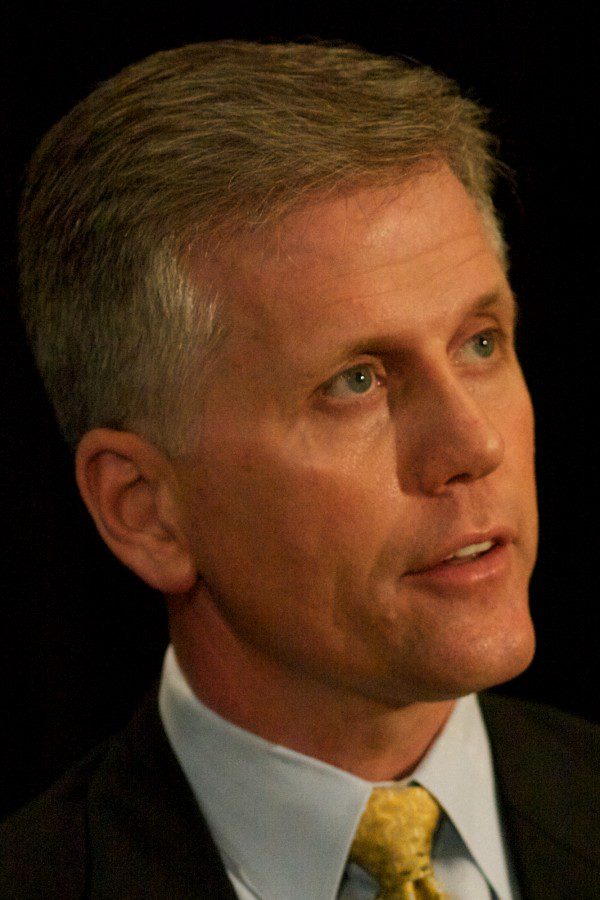A number of activist secretaries of state are dramatically changing a once non-partisan job that involves supervising elections.
Some have supported partisan legislation. Some have endorsed or advised their party’s candidates. In 36 states, the secretary of state also holds the title of chief election official.
The most aggressive of this new group are Republicans Kris Kobach, 46, of Kansas and Scott Gessler, 47, of Colorado.
They have been leaders in efforts to enact strict voter registration requirements in Kansas and to purge voting rolls in Colorado. Both say they want to stop voter fraud while critics, including Democrats and civil rights groups, say the measures would suppress voting.
Kobach and Gessler also have used their offices to endorse statewide and federal candidates. While Gessler endorsed Mitt Romney, Kobach said he’s an informal immigration adviser to the presidential candidate’s campaign.

However, Romney campaign regional press secretary Alison Hawkins told News21, that Kobach isn’t an adviser to the campaign on any issues, either formally or informally.
Kobach and Gessler aren’t alone.
Secretaries of State Brian Kemp of Georgia and Matt Schultz of Iowa, both Republicans, have supported voter ID legislation. All the states that have passed ID laws have Republican-majority legislatures except Rhode Island, which had a Democratic majority in 2011 when its law passed with bipartisan support.
Arizona’s Republican Secretary of State Ken Bennett added to the birther debate, largely Tea Party-driven, when he threatened to remove President Barack Obama’s name from the general election ballot unless Hawaii sent him the president’s birth certificate.
Bennett has since received it and apologized if he offended anyone.
Kobach and Gessler, more than others, are changing the role of a state’s election officer.

Kobach has been involved in national Republican politics since 2001 when he was chief immigration adviser to then-U.S. Attorney General John Ashcroft.
He went on to write S.B. 1070, Arizona’s contentious anti-immigration law. Three of four parts of that law were rejected in June by the U.S. Supreme Court.
Gessler addressed the Republican $250-a-plate Lincoln Day Dinner in Denver in June about voter fraud, saying, “People on the left say it doesn’t exist … but I’m from Chicago originally, where they used to say, ‘Vote early and vote often.’”
“In Denver, there are lots of unaffiliates (independents), there are lots of Democrats,” said Gessler. “We call it a target-rich environment. We are going to win this state. We are going to do it in Denver by converting people over to our banner, our point of view.”
Trey Grayson, who was Kentucky’s Republican secretary of state from 2004-2011, said he “cringes” today at partisan comments by Republican secretaries of state.
“I was a very proud Republican, but I was very cognizant of the fact that people needed to be able to trust elections,” said Grayson, who now directs the Institute of Politics at Harvard University’s Kennedy School of Government.
“So I tried to remember that in what I said, whether it was on a policy, on politics or on an individual, and always being aware of that appearance,” he added.
But Gessler believes his outspokenness is respectful to voters.
“When I say I’m a Republican and this is what I stand for, I think I’m giving people an honest choice,” Gessler said. “When people hide their party affiliation, or when people pretend there is no policy divide, pretend there is no choice here, what they’re really doing is masking what those choices are.”
Alexander Keyssar, professor of history and social policy at the Kennedy School, said the office should be nonpartisan.
“One of our many problems in the world of elections is that our election administration is generally partisan. They’re elected as members of a party. That’s how Katherine Harris could be secretary of state and state chair of Bush’s campaign simultaneously,” he said.
While serving as Florida’s Secretary of State under then-Gov. Jeb Bush, Harris was accused of partisan bias as she declared George W. Bush the winner of Florida’s electoral votes in the 2000 presidential election, a decision ultimately upheld by the U.S. Supreme Court.
Unlike Kobach or Gessler, Harris didn’t tackle controversial public policy issues such as immigration and voter ID.
Kobach was elected as Kansas secretary of state in 2010 after a two-year stint as Republican Party chairman. He co-wrote the state’s Secure and Fair Elections Act, requiring photo ID to vote and, effective next year, proof of citizenship to register to vote.
Kobach argues he can fairly govern his state’s elections and also take strong partisan stances. While campaigning, Kobach told voters he would work on voter ID and anti-immigration legislation.
“My opponents tried to use that against me,” he said. He beat his Democratic opponent by more than 21 points.
Kobach believes “a person can be a strong Republican or a strong Democrat and still approach the administration of elections with a nonpartisan, evenhanded attitude.”
Similarly, when Gessler took office in January 2011, the Denver Post reported his intention to continue practicing law at Hackstaff Gessler LLC. His Denver-based firm “specializes in campaign and elections law and has represented a number of Republican-aligned clients,” according to the newspaper.
Colorado Common Cause and Colorado Ethics Watch, two groups that aim to hold government accountable, called this a conflict of interest.
Gessler consulted with Colorado’s Republican attorney general and then decided to leave the firm, even though he said he would have only worked on real estate cases.
“At the end of the day, it caused a lot of controversy and it really become untenable,” Gessler said.
He’s since spent significant time in the courtroom, dealing with at least 10 lawsuits. These involve handling of ballots for inactive voters, attempting to reform campaign finance in Colorado, and addressing public access to ballots.
The partisanship of secretaries of state in the role of chief election official “is an obvious conflict of interest between the essential obligation to serve all voters and their attachment to one of the major political parties,” said Daniel Tokaji, an election law professor at the Ohio State University Moritz College of Law.
Currently, more Republicans than Democrats have made their secretary of state offices partisan, Grayson said. Of the 36 secretaries of state who are chief election officers, 23 are Republican and 13 are Democratic.
One outspoken, partisan Democratic secretary of state is Minnesota’s Mark Ritchie.
He grabbed the national spotlight through election recounts. Conservatives questioned Ritchie for calling Al Franken the winner of a 2008 Senate race, and two years later Mark Dayton the winner of a gubernatorial recount.
Both winning candidates are also Democrats.
Ritchie is outspoken on voting rights issues. Unlike the Republican secretaries of state, he opposes a voter ID requirement in Minnesota, saying it will disenfranchise voters and cost millions in unnecessary expenses.
Minnesota has 4,000 polling places with 30,000 election judges, Ritchie said. He downplays the influence a secretary of state has as chief election officer.
“It’s the towns that run the elections. The counties are the chief election officers and they own and control their voter list completely,” Ritchie said. “We don’t own the elections. This is why a lot of this conversation about secretaries is kind of meaningless in a way.”
Minnesota Republicans say Ritchie is trying to influence voters by renaming two proposed constitutional amendments – one requiring voters to show photo ID and the other banning same-sex marriage – on the November ballot.
The GOP legislature called the voter ID amendment “Photo Identification Required for Voting” and Ritchie retitled it, “Changes to in-person and absentee voting and voter registration; provisional ballots.”
Ritchie changed the language of the same-sex amendment from “Recognition of Marriage Solely Between One Man and One Woman,” to “Limiting the Status of Marriage to Opposite Sex Couples.”
Amendment proponents say Ritchie has changed the titles to confuse voters and help defeat the measures to benefit Minnesota Democrats.
In a country so divided along party lines, secretaries should be wary of partisan politics, said Doug Chapin, a University of Minnesota researcher and director of the Program for Excellence in Election Administration.
Jocelyn Benson, a professor at Wayne State University in Detroit, who was the Michigan Democratic nominee for secretary of state in 2010, said the officeholder should be an advocate for voters.
“So the question is are they making decisions that are in the best interest of the voters or are they simply advancing what their party’s agenda is?” said Benson, who wrote “Secretaries of State: Guardians of the Democratic Process.”
To some degree, she added, the public should expect secretaries to advance their party’s political agenda. However, balance is needed in Republicans’ desire for integrity in elections and Democrats’ expectations for access to voting, said Benson.
“The challenge is to do both and to essentially make it easier to vote and harder to cheat,” she said.
In Louisiana, state law keeps some partisan politics out of the secretary’s office. Secretary of State Tom Schedler can’t endorse candidates, serve on campaign committees of candidates or make campaign contributions.
In New Mexico, Secretary of State Dianna Duran has not endorsed candidates. Her office believes it would conflict with the New Mexico Governmental Conduct Act.
Other states’ secretaries don’t endorse candidates out of personal belief. Massachusetts Secretary of State William Galvin, a Democrat, hasn’t endorsed a candidate since he took office in 1995.
In Maine, Republican Secretary of State Charlie Summer, is a candidate for U. S. Senate and, like many other states, his office oversees elections. Summer has not endorsed any candidates and was criticized by U. S. Sen. Olympia Snowe, a fellow Republican, for failing to endorse her when she had planned to run for reelection. She later withdrew and that is the seat Summers is seeking.
A spokesman for Summers told Politico he did not make the endorsement because he had just taken the secretarf job and the timing for an endorsement was “inopportune.”
The secretary of state position in Maine has a partisan history – the secretary is elected by the legislature and the job almost always goes to a member of the dominant party, as it did in Summers’ case.
South Dakota’s two previous secretaries of state, Chris Nelson and Joyce Hazeltine, served for a combined 24 years. Like Galvin, they personally choose to never endorse a candidate.
But in June, South Dakota Secretary of State Jason Gant, a Republican, endorsed then-Republican presidential candidate Rick Santorum and South Dakota Republican state senate candidate Val Rausch.
“The operation of elections has a vast amount of laws,” Gant said. “Whether people endorse or not or do different political maneuvers, the laws we have in our state are very strong.”
Other states stay clear of partisan politics by using election boards and commissions. State election boards or commissions administer elections in 11 states and Washington D.C.
The Wisconsin Government Accountability Board, for example, consists of six former judges as a nonpartisan staff. Together, they oversee the state’s elections, campaign finance, ethics and lobbying laws.
“The benefit of having a board like ours is that all of our judges are trained decision makers. They know how to weigh the evidence, how to look at the law and how to apply it,” said Reid Magney, the Wisconsin Government Accountability Board public information officer.
With a partisan secretary of state, Magney said, opponents will say, “it’s because you’re a Democrat or it’s because you’re a Republican” that a decision was made.
Kobach and Gessler disagree.
They think a secretary of state who is also the chief election official means greater accountability.
“They’re not as politically accountable as a single elected official,” said Kobach of election boards.
Secretaries of state who also are the chief election officer “subject themselves to the scrutiny of voters … so you have public accountability built in,” Gessler said.
Including Kobach and Gessler, 32 secretaries serving as chief election officials are elected. Florida, Pennsylvania and Texas secretaries of state are appointed by their governors. New Hampshire’s legislature names its secretary of state.
Delaware Election Commissioner Elaine Manlove, who was appointed by a Democratic governor to a four-year term, thinks elected secretaries, who must campaign, should not alienate other parties.
“I just don’t know how you split yourself down the middle like that,” she said.
Though Washington Secretary of State Sam Reed, a 12-year veteran, has made political endorsements, he’s been praised for running elections fairly, most notably in 2004 when he oversaw the closest gubernatorial election recount in U.S. history.
Reed, a Republican, introduced two popular changes: the nation’s first top-two primary system and an all-vote-by-mail system.
“When you’re there to talk about elections, you’re there just to make the system work better, not with some partisan ax to grind, or get back at someone for something they have done before,” Reed said.
New Hampshire Secretary of State Bill Gardner runs his election system similarly. The Democrat first took office in 1976 and has since been re-elected by both Republican and Democratic legislatures.
With Reed and Gardner as possible exceptions, Tokaji calls addressing partisan election administrations the great-unfinished business of election reform.
“The past decade we have seen a lot of changes, many of them positive, but we really haven’t addressed this problem when it comes to how our elections are run,” Tokaji said.
Joe Henke was a Hearst Foundations Fellow this summer for News21. This report is part of a project on voting rights in America produced by the Carnegie-Knight News21 program. For the complete Voting Rights in America project, visit votingrights.news21.com.
Maine voter law fight part of national trend
By Alex Remington of News 21
University of Maine student Gilliam Demers was stunned to learn last summer, as she gathered signatures for a voter registration referendum, that she had been accused of breaking the law.
The political science major was even more alarmed when Maine Secretary of State Charlie Summers wrote her parents, advising Demers to change her driver’s license registration or cancel her Maine voter registration.
University officials even told students that they could be fined or jailed for up to 10 years if convicted of voter fraud.

Summers, currently running for the open U.S. Senate seat as the GOP nominee, wrote that he was investigating alleged voter fraud based on a list of students compiled by state Republican Party Chairman Charlie Webster. Webster decried in an interview what he called “rampant fraud” and said that the state made it too easy for persons “to knowingly vote in a place you have no intention of living in.”
It was the most contentious point in a nearly six-month struggle to add strict provisions for voting. Republicans said Maine elections were vulnerable to abuse by ineligible voters, including college students who were from out of state.
In a party-line vote last June, GOP legislators ended Maine’s longtime practice of allowing voter registration on Election Day, moving the deadline two days before elections.
The fight ended in November, when voters overrode the Legislature in a People’s Veto that restored election-day registration. The veto was buoyed by a grass-roots movement and volunteers like Demers.
After the People’s Veto, some of the bill’s supporters questioned the wisdom of pushing the measure.
“This was very partisan, and people weren’t sure if they wanted to do it,” said state Sen. Nichi Farnham, a Republican and chair of the legal affairs committee, which oversees all election bills. “Maybe we didn’t need to change the law.”
At issue was the assertion of fraud.
“No one believes there’s no fraud,” Webster said.
Summers’ investigation of alleged fraud began in July 2011 and included the list of 206 students from Webster, who wanted Summers to investigate every out-of-state student registered to vote in Maine. When they received the letter from Summers, 64 students canceled their Maine voter registration. On advice from the American Civil Liberties Union, Demers did not.
No charges were filed against any of the students who were investigated for fraud.
Only two cases of voter fraud have been presented and successfully prosecuted in Maine, Summers concluded in a Sept. 21 report to the Legislature. But he also wrote that there were hundreds of clerical errors in voter files and many of those mistakes occurred on Election Day.
Summers pushed the Legislature to eliminate election-day registration, arguing that clerks were overworked and that Maine was “headed for a meltdown” because town voting officials couldn’t accurately process all the registrations that they received in one day.
But the Maine Municipal Association and the Maine Town and City Clerks’ Association — the two primary organizations that represent clerks and registrars — supported election-day registration.
“Let’s put it this way; it’s a lot of work,” said Wanda Thomas, who is town clerk in Orono, where the main University of Maine campus is located. “[But] it was a little easier to do it in one day than if all of those students came to this office to register in person before Election Day, because we don’t really have the staff for that.”
The GOP bill called for ending same-day registration in person and by absentee, and set deadlines two business days before the election for both. The clerks’ association only objected to same-day absentee registration.
Maine was among the first states to allow election-day registration, with the law enacted unanimously in 1973.
“Ironically, a Republican state senator from Farmington sponsored the legislation,” said Sen. Barry Hobbins, leader of the Maine Senate Democrats.
Eight states and the District of Columbia place no deadline on voter registration. Other state deadlines vary.
A 2009 Pew Center on the States study concluded that turnout rose by 3 to 5 percent in states that adopted election-day registration.
Proponents of election-day registration argue that ending it would lower voter turnout.
“As Republicans, we didn’t have a lot of good comebacks to that,” Farnham said.
Money poured in on both sides. Veto supporters received more than $1 million, including $400,000 from S. Donald Sussman, a billionaire hedge fund founder who lives in Connecticut and Maine and is married to U.S. Rep. Chellie Pingree, a Democrat who represents southern Maine. Sussman also own three of Maine’s seven daily newspapers: Portland Press Herald, Morning Sentinel and Kennebec Journal.
Veto opponents collected $370,000, including $250,000 from the American Justice Partnership, a Michigan organization formerly associated with the National Association of Manufacturers. The partnership, which does not disclose donors, received $300,000 last year from Crossroads GPS, a “super” political action committee run by GOP strategist Karl Rove.
Veto supporters collected 70,000 signatures by August 2011 to get the issue on the November ballot. The People’s Veto restored in-person, same-day registration, but left the absentee registration deadline in place. It passed with 60 percent of the vote.
“The idea that removing the ability to register on Election Day will protect the vote is truly specious,” said Matt Dunlap, a Democrat who served as Maine secretary of state from 2000 to 2008 and was an unsuccessful candidate this year for the Democratic U. S. Senate nomination. “Voter fraud is largely mythology.”
This report is part of a project on voting rights in America produced by the Carnegie-Knight News21 program. For the complete Voting Rights in America project, visit votingrights.news21.com.







